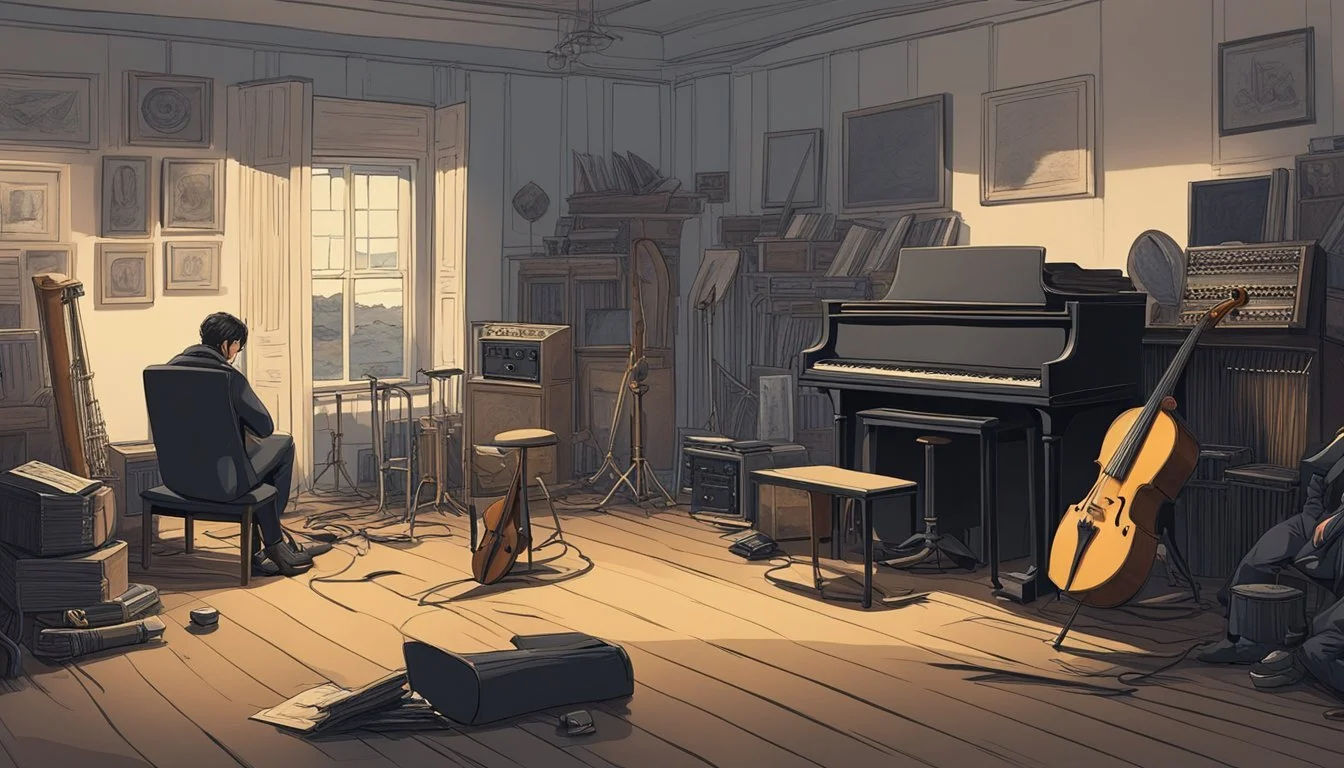Beatles' Blues: George Harrison's Battle with Depression
A Hidden Struggle Behind the Music
George Harrison, often referred to as the "Quiet Beatle," experienced profound emotional struggles throughout his life. His musical journey with The Beatles brought immense success but also great personal challenges. Behind the scenes, Harrison grappled with clinical depression, a condition that deeply influenced his songwriting and creative output.
The titles of Harrison's songs offer glimpses into his inner turmoil. Tracks like "For You Blue," "Deep Blue," "So Sad," and "Tired of Midnight Blue" hint at the darkness he faced. His experiences with depression shaped his artistic expression, infusing his music with raw emotion and introspection.
Harrison's battle with depression extended beyond his time with The Beatles. As he navigated solo projects and personal endeavors, the weight of his mental health struggles remained. His journey serves as a reminder that even those who achieve great fame and success can face internal battles unseen by the public eye.
The Quiet Beatle's Early Life
George Harrison's journey from a Liverpool lad to a global music icon shaped his identity as the "Quiet Beatle". His formative years and musical influences laid the foundation for his role in The Beatles and beyond.
From Liverpool to Beatlemania
George Harrison was born on February 25, 1943, in Liverpool, England. He grew up in a working-class family, the youngest of four children. Harrison's interest in music blossomed early, inspired by the skiffle craze of the 1950s.
At age 15, Harrison joined John Lennon and Paul McCartney in the Quarrymen. This group evolved into The Beatles, catapulting the young guitarist into worldwide fame.
The band's meteoric rise during the early 1960s thrust Harrison into the spotlight. Despite his reserved nature, he adapted to the frenzy of Beatlemania with a quiet resilience.
Musical Influences and Formative Years
Harrison's musical style was shaped by diverse influences. He admired rock 'n' roll pioneers like Carl Perkins and Chuck Berry. Their guitar techniques left a lasting impact on his playing.
The young musician also developed a fascination with Indian classical music. This interest would later influence The Beatles' sound and Harrison's solo work.
During The Beatles' early years, Harrison honed his skills as a guitarist. He contributed to the group's evolving sound, though often overshadowed by Lennon and McCartney's songwriting partnership.
Harrison's role as the "Quiet Beatle" stemmed from his introspective nature and spiritual curiosity. These traits would continue to define his musical journey throughout his career.
Emergence as a Songwriter
George Harrison's growth as a songwriter marked a significant shift in The Beatles' creative dynamics. His contributions evolved from occasional album tracks to some of the band's most beloved songs.
Beyond Lennon-McCartney
Harrison's early songwriting efforts were overshadowed by the prolific Lennon-McCartney partnership. His first composition for The Beatles, "Don't Bother Me," appeared on their second album in 1963. As the band progressed, Harrison's confidence grew.
By 1965, he was consistently contributing one or two songs per album. His Indian-influenced "Within You Without You" on Sgt. Pepper's Lonely Hearts Club Band showcased his expanding musical horizons.
Harrison's frustration with limited songwriting opportunities led him to stockpile material. This resulted in a wealth of songs for his post-Beatles career.
Signature Songs and Artistic Growth
Harrison's songwriting reached new heights in the band's later years. "While My Guitar Gently Weeps" from The White Album demonstrated his maturing style and emotional depth.
His crowning achievements came on Abbey Road with "Something" and "Here Comes the Sun." "Something" became The Beatles' second most-covered song after "Yesterday." Frank Sinatra praised it as "the greatest love song of the past 50 years."
"Here Comes the Sun" remains one of Harrison's most popular compositions. Its optimistic tone and memorable melody have made it a fan favorite for decades.
These songs solidified Harrison's status as a world-class songwriter in his own right, stepping out of the shadow of Lennon and McCartney.
Spiritual Journey and Creative Influence
George Harrison's spiritual awakening profoundly shaped his musical style and worldview. His exploration of Eastern philosophies and Indian music led to innovative contributions to the Beatles' sound and popular culture.
Incorporation of Indian Music and Philosophy
Harrison's fascination with Indian culture began in 1965 when he encountered a sitar on the set of "Help!". He studied under renowned sitarist Ravi Shankar, mastering the instrument and absorbing Indian musical traditions. This immersion influenced Harrison's songwriting, evident in tracks like "Norwegian Wood" and "Within You Without You".
Harrison embraced Hinduism and practiced Transcendental Meditation. These spiritual pursuits inspired lyrics exploring themes of self-realization and cosmic consciousness. His song "The Inner Light" directly quoted the Tao Te Ching, showcasing his deep engagement with Eastern philosophy.
Impact on the Beatles' Sound and Culture
Harrison's spiritual journey significantly influenced the Beatles' musical direction. He introduced Indian instruments like the sitar, tabla, and tambura into their recordings. This fusion of Western rock with Eastern sounds created a unique psychedelic aesthetic that defined the band's later work.
His advocacy for Transcendental Meditation led the Beatles to study with Maharishi Mahesh Yogi in India. This experience inspired songs on "The White Album" and influenced the band's image and public persona. Harrison's spiritual interests also contributed to the popularization of yoga and Eastern spirituality in Western culture.
George Harrison's Solo Career
George Harrison's post-Beatles career showcased his musical talents and spiritual journey. He released critically acclaimed albums and achieved commercial success as a solo artist.
Breaking Away from the Fab Four
Harrison embarked on his solo career with enthusiasm after The Beatles' breakup in 1970. His debut album, "All Things Must Pass," was a triple LP that demonstrated his pent-up creativity. The record featured the hit single "My Sweet Lord," which topped charts worldwide.
Harrison's distinctive guitar work and introspective songwriting set him apart from his former bandmates. He explored themes of spirituality and personal growth in his music, reflecting his interest in Eastern philosophy.
Critical Acclaim and Popular Solo Work
"All Things Must Pass" received widespread critical acclaim and commercial success. It established Harrison as a formidable solo artist in his own right.
His 1973 album "Living in the Material World" continued his spiritual themes and topped the US charts. The title track and "Give Me Love (Give Me Peace on Earth)" showcased Harrison's evolving songwriting skills.
Harrison's solo work often featured collaborations with other prominent musicians. He organized the groundbreaking Concert for Bangladesh in 1971, setting a precedent for celebrity benefit concerts.
His 1987 album "Cloud Nine" marked a successful comeback, producing the hit single "Got My Mind Set on You."
Personal Struggles and Public Battle
George Harrison faced numerous challenges during and after his time with The Beatles. These ranged from internal emotional turmoil to external conflicts with business associates and bandmates.
Confronting Depression and Illness
Depression plagued Harrison throughout his life, often stemming from the pressures of fame and creative frustrations. The intense scrutiny and expectations that came with being a Beatle took a toll on his mental health.
Harrison turned to Eastern spirituality and meditation as coping mechanisms. These practices became integral to his personal philosophy and music.
In later years, Harrison battled throat cancer. He underwent surgery in 1997 and received radiotherapy treatments. Despite health setbacks, he continued to create music and remained active in various charitable causes.
Legal Troubles and Managerial Disputes
The dissolution of The Beatles led to complex legal battles. Harrison expressed his frustrations in the song "Sue Me, Sue You Blues," a direct reference to the lawsuits between band members.
Conflicts arose with Allen Klein, the band's manager after Brian Epstein's death. Klein's aggressive business tactics and alleged financial mismanagement caused significant stress for Harrison and his bandmates.
These disputes resulted in protracted court cases and damaged relationships within the group. Harrison felt particularly disillusioned with the music industry's business side, influencing his solo career decisions.
Collaborations and Humanitarian Efforts
George Harrison's musical journey extended beyond his solo career, encompassing charitable causes and partnerships with fellow artists. His humanitarian efforts and musical collaborations left a lasting impact on both the music industry and global philanthropy.
Concert for Bangladesh and Other Charity Work
George Harrison organized the Concert for Bangladesh on August 1, 1971, at Madison Square Garden in New York. This groundbreaking event raised millions for UNICEF's emergency relief efforts in Bangladesh.
The concert featured an all-star lineup including Ravi Shankar, Bob Dylan, and Eric Clapton. It set a new standard for celebrity-driven humanitarian efforts in the music industry.
Harrison's philanthropic work continued throughout his life. He supported various causes, including UNICEF, Lupus LA, and Covenant House.
Pairings with Other Music Legends
Harrison formed the supergroup Traveling Wilburys in 1988 with Bob Dylan, Jeff Lynne, Roy Orbison, and Tom Petty. The band released two successful albums, showcasing Harrison's collaborative spirit.
His longstanding partnership with Indian sitar maestro Ravi Shankar led to numerous musical projects. They worked together on albums, concerts, and cross-cultural musical exchanges.
Harrison also collaborated with Eric Clapton on several occasions, including Clapton's hit song "Badge" and Harrison's album "Cloud Nine."
These collaborations allowed Harrison to explore diverse musical styles and expand his artistic horizons beyond his Beatles fame.
George Harrison's Legacy and Influence
George Harrison's impact extends far beyond his time with The Beatles. His musical innovations, spiritual explorations, and humanitarian efforts continue to resonate decades after his passing.
Cultural Impact and Enduring Popularity
Harrison's music remains a staple of popular culture. Songs like "Here Comes the Sun" and "My Sweet Lord" are still widely recognized and beloved. His solo album "All Things Must Pass" is considered a masterpiece, influencing generations of musicians.
Harrison's incorporation of Indian instruments and philosophy into Western music helped popularize world music. This cross-cultural approach opened doors for greater musical diversity in rock.
His commitment to spirituality and meditation introduced Eastern philosophy to many Western fans. This spiritual aspect of his work continues to attract new listeners seeking deeper meaning in music.
Inspiring Musicians and Peace Advocates
Harrison's guitar work and songwriting have inspired countless musicians. His signature slide guitar technique and use of exotic instruments expanded the sonic possibilities of rock music.
Many artists cite Harrison as a major influence, from Tom Petty to Noel Gallagher. His approach to composition, blending rock with folk and world music elements, paved the way for more eclectic styles.
Harrison's dedication to humanitarian causes set a precedent for celebrity activism. He organized the groundbreaking Concert for Bangladesh in 1971, one of the first major charity concerts. This event became a model for future benefit shows like Live Aid.
His advocacy for peace and environmental causes continues to inspire. The George Harrison Fund for UNICEF carries on his philanthropic legacy, supporting children in need worldwide.








